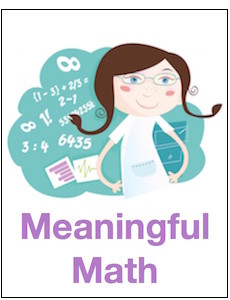How Covid Is Improving My Teaching Practice
A MiddleWeb Blog

We have been mostly F2F with some virtual – so “hybrid.” Several students have had to learn virtually even though that isn’t something they would have chosen, and many have had to learn virtually without adequate internet service.
More students than ever before are working after school and on the weekends to help their parents make ends meet.
Watching them having to go through all of these things, I decided that I would say “yes” to any reasonable request this year (obviously while keeping the students safe and learning and following school policies). That’s a big deal for me, because for some reason my default answer in the past has been NO.
Things I have said yes to this year…
- Can I turn it in tomorrow? (It was due two weeks ago.)
- Could you print me off another worksheet?
- Will you review for the test for the first few minutes of class?
- Can we spend another day going over….
- Can we use our notes on the test?
- Can I have another pencil?

I wanted to share what I have learned from trying to be really flexible, and saying “Yes” whenever I possibly can. The results of doing this were not what I was expecting.
What has been the result?
What surprises me is how little saying YES has impacted the outcomes in my classroom. Some students turn in their work late, but most turn it in on time. I don’t think students have abused the late work policy. I haven’t been able to cover as much material as I usually do, but that was never going to happen this year anyway.
I let my students use their notes on tests, and I don’t think it greatly reduced the rigor. I do think it motivated them to take notes and keep up with them. Providing supplies, like pencils and paper, is more for my sanity. They just take what they need and it simplifies matters.

After a quick review (maybe 5 minutes) they seemed more confident. They asked me fewer questions during the test and in general did better.
I have had a lot of good results from saying yes to my students’ requests and needs and making concessions. It’s made me wonder why I said no to some of these things in the past.
Why did I think it was important to start with?
I’m not sure why I thought some of these things were so important in previous years. I guess I thought printing off extra copies and providing pencils made me think that I wasn’t teaching my students about responsibility. Which is probably true, but then is that my main job?
This year in particular I am focused on teaching them as much math as I can and trying not to stress them out any more than they already are.
As far as reviewing right before the test, I usually don’t want to do that because I don’t think we will have enough time. Plus, I have always thought that if I review right before the test, it somehow invalidates the results. Part of me thought that they should have studied enough the night before so that they wouldn’t need another review.
All of this has made me really think about what my purpose really is, and what is important in my classroom. The answer, of course, is LEARNING.
How have my students responded?
My students have been genuinely grateful for all the help. That in itself is not surprising. What has surprised me is how that has translated into my students being more willing to work for me. I have been touched to see how much effort they have given in my class. We spent two and a half weeks preparing for the ACT, and most of the students worked very hard.
With that being said, they are normal teenagers and they have off-days. And not all students have been willing to engage with the work. But for the most part they have cheerfully tried to do the work I have asked them to do. That’s not an easy thing, because they do have gaps in their understanding due to missing so much face-to-face class time and it can be frustrating for them.
Also, students have been more willing to ask me for help. I have more students that will take the time to get extra help than I have ever had before. In general, I have a better relationship with more of students than I have had in years past.
What does this mean for the future?
I think it means some of things that I thought were important, aren’t really that important. And being reasonable and flexible and saying yes when I can does build goodwill that translates into more effort from my students. It has made me happy to go to work.
I am physically drained at this point in the year, but I truly look forward to seeing my students every day. I have not been able to say that every year. Before next year I need think about what really matters in my classroom and how I can work to build the same kind of relationships with my students that – to my surprise – has been the hallmark of our Covid year.
Edutopia has republished portions of this article.































Thank you! This is so very important. I admire and appreciate your flexibility and self-reflection!
Thank you for your comment! The longer I teach the more I realize how important being flexible is, even though sometimes it’s really difficult!
Michelle, I really appreciate this blog. As I read it I thought about how important it is for each of us to determine our “big rocks”–the most important things–and not overwhelm ourselves and others with too many constraints. It does require giving up some control, but I smiled as I read your and your students’ response to this. My final thought: You were so wise to think of and try out this approach during this stressful year. Kudos to one whom I know to be a master teacher!
Thank you for your kind words! What you said about giving up control is so true! I find it to be really uncomfortable at times. But I think in the long run it made things less stressful for me.
Love this approach. Thanks for sharing with others who may lose sight of what is truly important.
Thank you!
There are many great thoughts in your post. This has been a tough year for educators and students. There will be many things that will remain as we move to a more normal next year.
As a typical HS math teacher who began teaching over 40 years ago I said and did many of the things that you mention. Looking back I feel bad about those times. My poor excuse is that I did not know any better and have learned to be a better teacher in many, many ways. My guiding saying is “Students do not care what you know until they know you care.” Thanks for sharing and keep up the good work.
Thank you! I am a teacher education college student and I found this to be profound advice and research-based (thank you very much)! Your thoughts, actions and compassion in the classroom reminds me that my future classroom is not the whole world and my actions of compassion and understanding are more impactful than relying on a strict adherence to “teaching students responsibility.”
Thanks for all you do to serve students.